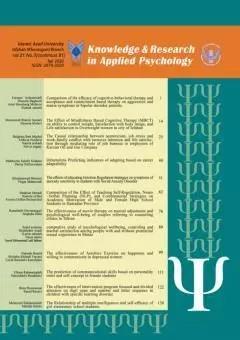The Effect of the Home-School Collaboration Program Training of parents and teachers on academic performance and behavioral disorder of Students with Attention-Deficit / Hyperactivity Disorder
Subject Areas : ChildShahrooz Nemati 1 * , rahim badri 2 , Niloofar Broumandzadeh 3
1 - Professor, School of Educational Sciences and Psychology, University of Tabriz, Tabriz, Iran.
2 - Professor, School of Educational Sciences and Psychology, University of Tabriz, Tabriz, Iran.
3 - School of Educational Sciences and Psychology, University of Tabriz, Tabriz, Iran.
Keywords: academic performance, behavioral disorder, home-School collaboration, attention-deficit / hyperactivity disorder,
Abstract :
The aim of the current research was to study the effectiveness of the home-school collaboration training program on academic performance and behavioral disorder in students with attention-deficit/hyperactivity disorder. The research design was a quasi-experimental pretest-posttest with a control group. The study population included parents, teachers, and students with attention-deficit/hyperactivity disorder in schools in the 4th district of Tabriz in 2021, that 30 of them were selected by using the convenience sampling method and randomly assigned into experimental and control groups. The academic performance questionnaire of Dortaj (2005) and Rutter̓s Children Behaviour Questionnaire for teachers(1964) were used to collect the data. The home-school collaboration program was trained in nine sessions for parents and teachers. Multivariate analysis of covariance revealed that there was a significant change in academic performance and behavioral disorder in the experimental group under the influence of a home-school collaboration training program(p<0/05). Due to the effectiveness of the home-school collaboration program training, the development and implementation of this program is recommended for other groups with disabilities, teachers and their parents.
Adamiat, A., Varasteh, A. & Nezamdoust, A. (2019). The Effectiveness of Play Therapy in Reducing Behavioral Disorders in Children with Down Syndrome. Quarterly Journal of Child Mental Health, 5(4), 218-227.
Apodaca, R. F. D., Gentling, D. GSteinhaus, J.K., & Rosenberg, E.A. (2015). Parental Involvement as a Mediator of Academic Performance Among Special Education Middle School Students. School Community Journal, 25(2): 35-54.
Ashofteh, M., Mirzamani, M., Banisi, P. (2017). Evaluate the Effectiveness of Creative Displays Behavioral Disorders and Emotional Intelligence in Preschool Children. Journal of Excellence in counseling and psychotherapy, 5(20), 34-51.
Barger, M. M., Kim, E. M., Kuncel, N. R., & Pomerantz, E. M.(2019). The relation between parents’ involvement in children’s schooling and children’s adjustment: A meta-analysis. Psychological Bulletin, 145(9), 855–890.
Doerries, D. & Grosser, D. (2017). Classroom Interventions for Attention Deficit/ Hyperactivity Disorder Considerations Packet. Training & Technical Assistance Center: T/TAC W&M.
Dortaj, F. (2005). The effectiveness of process and product-oriented mental simulation on student̓s academic performance, construct and standardize an academic performance test. Quarterly Journal of New Thoughts on Education, 1(2), 7-21.
DuPaul, G.J., Kern, L, Belk, G.,Custer, B, Hatfield, A., Daffner, M, & Peek, D. (2018). Promoting Parent Engagement in Behavioral Intervention for Young Children With ADHD: Iterative Treatment Development. Topics in Early Childhood Special Education, 38(1): 42– 53.
Elahi, Z., Hajitabar Firouzja’ee, M. & Abedini, M. (2020). Multiple Dimensions of Parental Involvement and their Role in Academic Motivation of Primary School 6th Graders. Quarterly Journal of Family and Research, 17 (1) :103-126.
Epstein, J., Sanders, M., Simon, B., Salinas, K., Jansorn, N., & Van Voorhis, F. (2009). School, family, and community partnerships: Your handbook for action. Thousand Oaks, CA: Corwin.
Ewe, L.P. (2019) ADHD symptoms and the teacher–student relationship: a systematic literature review. Emotional and Behavioural Difficulties, 24(2): 136-155.
Ghasemtabar, S., Fayaz, I., Hoseyni, M. (2016). Predicting Achievement Motivation and Academic Performance of Students through Self-Efficacy and Cognitive and Metacognitive Strategies of Learning. Preschool and Elementary School Studies, 2(6), 107-123.
Ghorbanian, E., PourEbrahim, T., Mousavi, P. & Habibi, M. (2016). Social Adjustment and Academic Achievement of Female Children with Secure and Insecure Attachment Patterns. Quarterly Journal of Family and Research, 13 (3): 87-108.
Mautone, J.A., Lefler, E.K., Power, Th.J. (2011). Promoting Family and School Success for Children with ADHD: Strengthening Relationships While Building Skills. Theory Pract, 50(1), 43–51.
Mendoza, A.L., McKeithan, G.K. and Griswold, D.E. (2019). Effective Homeschool Programming for Students with Autism Spectrum Disorder. Home School Researcher, 34(3), 1-5.
Mohammadi Pouya, S., Adib, Y. & Zarei, A. (2020). Appropriate strategies for increasing the linkage between home, school and Community; Utilization of global experiences. Journal of School Administration, 8(3), 370-336.
Pfiffner, L.J., Rooney, M.E., Jiang,Y., Haack,L.M., Beaulieu, A. & McBurnett, K. (2018). Sustained Effects of Collaborative School-Home Intervention for ADHD Symptoms and Impairment. Journal of the American Academy of Child and Adolescent Psychiatry, 57: 245-251.
Qasim, M., Saleem, A.& Hafeez, M. (2021). Parental Involvement in Online Learning and Academic Achievements of their Children under COVID-19 Conditions. Pakistan Social Sciences Review, 5(4): 1-14.
Rahimi, M., Shirband, E. & Asadi, S. (2020). The Relationship between Quality of Parental Homework Involvement and Academic Functioning in the Reading Domain among Sixth Grade Students. Quarterly Journal of Family and Research, 16 (4) : 65-82.
Shultz, K. S., Whitney, D. J., & Zickar, M. J. (2014). Measurement theory in action: Case studies and exercises. Routledge Pub.
Sorajjakool, S. & Hui, X. (2015). Strengthen the Home-School Collaboration for Student Achievement. Apheit Journal, 4(2): 139-147.
Sormunen, M., Tossavainen,K. & Turunen, H. (2011). Home–School Collaboration in the View of Fourth Grade Pupils, Parents, Teachers, and Principals in the Finnish Education System. The School Community Journal, 21(2): 185-211.
Takri, B.B. & Jaiswal, J. (2019). Academic Performance of Students with Attention Deficit Hyperactivity Disorder (ADHD) and Students without ADHD. International Journal of Engineering Development and Research, 7(2): 87-90.
Vaez, H., Zargar, Y., Naami, A., Doostgharin, T. & Mehrabizade Honarmand, M. (2019). The effects of Family and Schools Together (FAST) program on behavioral problems of students. Journal of Psychological Achievements, 26(2): 89-112.
Wendel,M., Ritchie, T., Rogers, M.A., Ogg, J.A., Santuzzi,A.M., Shelleby, E.C., & Menter, K. (2020) The Association Between Child ADHD Symptoms and Changes in Parental Involvement in Kindergarten Children’s Learning During COVID-19. School Psychology Review, 49(4):466-479.
Zarei, M., Sohrabi, N., Samani, S. (2017). The Effectiveness of Triangle Successful Design to Promote Students’ Academic Performance. Journal of New Approaches in Educational Administration, 7(28), 27-40.

